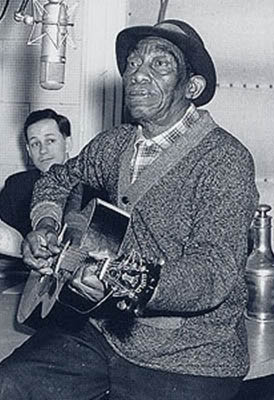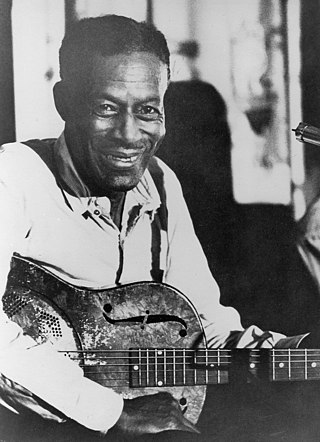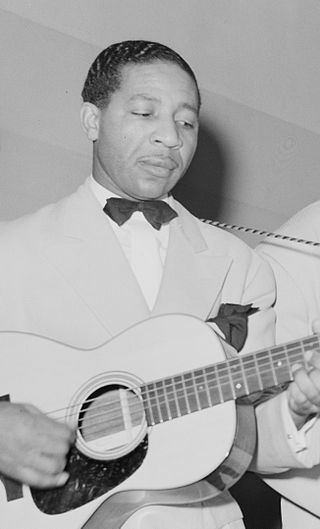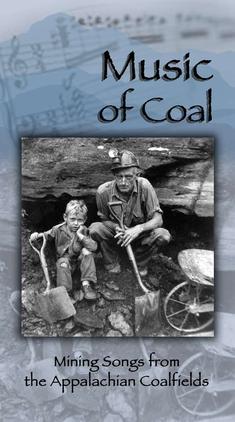
John Smith Hurt, known as Mississippi John Hurt, was an American country blues singer, songwriter, and guitarist.

Edward James "Son" House Jr. was an American Delta blues singer and guitarist, noted for his highly emotional style of singing and slide guitar playing.

Alonzo "Lonnie" Johnson was an American blues and jazz singer, guitarist, violinist and songwriter. He was a pioneer of jazz guitar and jazz violin and is recognized as the first to play an electrically amplified violin.

Moran Lee "Dock" Boggs was an American old-time singer, songwriter and banjo player. His style of banjo playing, as well as his singing, is considered a unique combination of Appalachian folk music and African-American blues. Contemporary folk musicians and performers consider him a seminal figure, at least in part because of the appearance of two of his recordings from the 1920s, "Sugar Baby" and "Country Blues", on Harry Smith's 1952 collection Anthology of American Folk Music. Boggs was first recorded in 1927 and again in 1929, although he worked primarily as a coal miner for most of his life.

Booker T. Washington "Bukka" White was an American Delta blues guitarist and singer.

Merle Robert Travis was an American country and western singer, songwriter, and guitarist born in Rosewood, Kentucky, United States. His songs' lyrics often discussed both the lives and the economic exploitation of American coal miners. Among his many well-known songs and recordings are "Sixteen Tons", "Re-Enlistment Blues", "I am a Pilgrim" and "Dark as a Dungeon". However, it is his unique guitar style, still called "Travis picking" by guitarists, as well as his interpretations of the rich musical traditions of his native Muhlenberg County, Kentucky, for which he is best known today. Travis picking is a syncopated style of guitar fingerpicking rooted in ragtime music in which alternating chords and bass notes are plucked by the thumb while melodies are simultaneously plucked by the index finger. He was inducted into the Nashville Songwriters Hall of Fame in 1970 and elected to the Country Music Hall of Fame in 1977.

Appalachian music is the music of the region of Appalachia in the Eastern United States. Traditional Appalachian music is derived from various influences, including the ballads, hymns and fiddle music of the British Isles, the African music and blues of early African Americans, and to a lesser extent the music of Continental Europe.

Wade Ward (1892–1971) was an American old-time music banjo player and fiddler from Independence, Virginia. He was widely known playing the clawhammer banjo and frequently won the Galax, Virginia Old Time Fiddler's Convention. His instrument, a Gibson RB-11 5-string banjo, is now in the collection of the Smithsonian Institution. Along with Kyle Creed, Wade Ward is known for his 'Galax' style of playing the clawhammer banjo.

Alexander Campbell "Eck" Robertson was an American fiddle player, mostly known for commercially recording the first country music songs in 1922 with Henry Gilliland.
Henry Franklin "Dick" Justice was an American blues and folk musician, who hailed from West Virginia, United States.
Arnold and Ervin Williamson were American folk musicians based in Logan County, West Virginia, United States, who were active in the 1920s and 1930s. Arnold played the fiddle while Ervin played the guitar and did vocals. The duo recorded several songs for Okeh Records in the late 1920s, and remained musically active in subsequent decades, although they rarely recorded. Their version of "Gonna Die With a Hammer in My Hand" has been reported as being the most popular version ever recorded. Musically, they were closely related to other folk musicians based in Logan County in the 1920s, such as Frank Hutchison and Dick Justice.

Aunt Molly Jackson was an influential American folk singer and a union activist. Her full name was Mary Magdalene Garland Stewart Jackson Stamos.
Albert Green Hopkins was an American musician, a pioneer of what later came to be called country music; in 1925 he originated the earlier designation of this music as "hillbilly music", though not without qualms about its pejorative connotation.

Music of Coal: Mining Songs from the Appalachian Coalfields is a 70-page book and two CD compilation of old and new music from southern Appalachian coalfields. The project was produced by Jack Wright and is a benefit for the Lonesome Pine Office on Youth in Wise County, Virginia.
William Henry Whitter was an early old-time recording artist in the United States. He first performed as a solo singer, guitarist and harmonica player, and later in partnership with the fiddler G. B. Grayson. He recorded the first version of "Going Down the Road Feeling Bad".

Flora E. Molton was a street singer and slide guitar player who performed gospel and blues music in Washington, D.C., from the 1940s to shortly before her death. She played slide guitar in the "bottleneck" style commonly employed by rural blues musicians, and she played the harmonica and tambourine.
Stovepipe No. 1, born probably Samuel Chambers Jones was an American blues musician and songster, active in the Cincinnati area of the United States. He made his first recordings in 1924.
Carl Rutherford was an American Piedmont blues, country blues, and Appalachian music guitarist, singer and songwriter.
Virginia Myrtle Ellis "Aunt Jennie" Wilson was a traditional clawhammer banjo player from Logan County, West Virginia.












